Related Research Articles
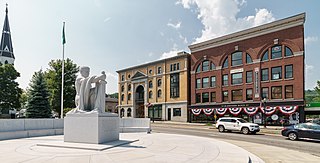
Barre is the most populous city in Washington County, Vermont, United States. As of the 2020 census, the municipal population was 8,491. Popularly referred to as "Barre City", it is almost completely surrounded by "Barre Town", which is a separate municipality.

The 2006 United States Senate election in Vermont was held November 7, 2006. Incumbent independent Senator Jim Jeffords decided to retire rather than seek reelection to a fourth term, and Bernie Sanders was elected to succeed him.

David E. Zuckerman is an American politician who served as the 84th lieutenant governor of Vermont from 2023 to 2025. He previously served two terms as the 82nd lieutenant governor of Vermont, from 2017 to 2021. A member of the Vermont Progressive Party, he previously served in the Vermont House of Representatives for seven terms (1997–2011), and the Vermont Senate for two (2013–2017). In 2020, Zuckerman was a candidate for governor of Vermont. He ran with the support of both the Progressive Party and the Democratic Party, but lost to incumbent governor Phil Scott in the general election.

Matt Dunne is an American politician and businessman from the U.S. state of Vermont. He served four terms in the Vermont House of Representatives, two terms in the Vermont State Senate, was the Democratic candidate in the 2006 Vermont Lt. Governor's race, and the fourth-place finisher in the Democratic primary during the Vermont gubernatorial election, 2010.

Peter Francis Welch is an American lawyer and politician serving since 2023 as the junior United States senator from Vermont. A member of the Democratic Party, he was the U.S. representative for Vermont's at-large congressional district from 2007 to 2023. He has been a major figure in Vermont politics for over four decades and is only the second Democrat to be elected a senator from the state.

William T. Doyle was an American politician, academic, and author who served as a Republican member of the Vermont Senate. As a senator from the Washington Vermont Senate District from 1969 to 2017, he is the longest-serving state legislator in Vermont history.
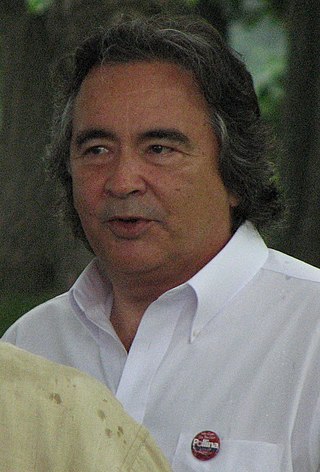
Anthony Pollina is an American politician who has served as Chair of the Vermont Progressive Party since 2017, and was as a member of the Vermont Senate from 2011 to 2023.

The 2014 Vermont gubernatorial election took place on November 4, 2014, to elect the governor of Vermont, concurrently with elections to the United States Senate in other states and elections to the United States House of Representatives and various state and local elections. Incumbent Democratic governor Peter Shumlin ran for reelection to a third term in office against Republican businessman Scott Milne, Libertarian businessman Dan Feliciano and several other minor party and independent candidates.

The 2016 Vermont gubernatorial election took place on November 8, 2016, and elected the governor of Vermont, concurrently with the 2016 U.S. presidential election, as well as elections to the United States Senate in other states and elections to the United States House of Representatives and various state and local elections. Incumbent Democratic governor Peter Shumlin was eligible to run for re-election to a fourth term in office, but opted to retire instead.
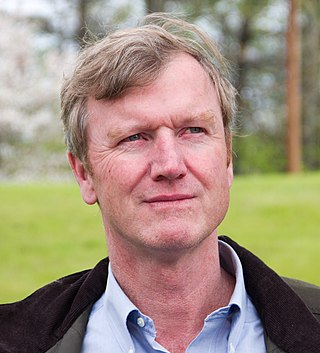
Scott Edward Milne is an American businessman and political candidate from North Pomfret, Vermont. A Republican, Milne was the party's nominee for Lieutenant Governor of Vermont in 2020, losing to Democrat Molly Gray; the nominee for United States Senate in 2016, losing to incumbent Democrat Patrick Leahy; and the nominee for Governor of Vermont in 2014, losing to two-term incumbent Peter Shumlin in the closest gubernatorial election in Vermont since 1962.
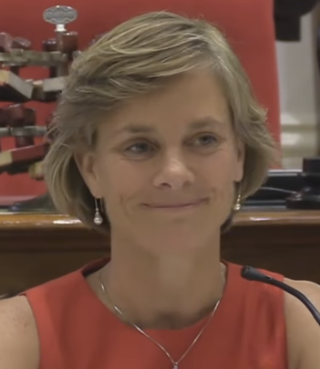
Sue M. Minter is an American politician from the state of Vermont. She served in the Vermont House of Representatives from 2005 to 2011, led Vermont's recovery efforts after Tropical Storm Irene, and became secretary of the Vermont Agency of Transportation in 2015. Minter was the Democratic Party nominee in the Vermont gubernatorial election of 2016. She lost to the Republican Party nominee Phil Scott.

The 1988 United States House of Representatives election in Vermont was held on November 8, 1988. Republican nominee Peter Plympton Smith defeated Independent candidate Bernie Sanders and Democratic nominee Paul N. Poirier.
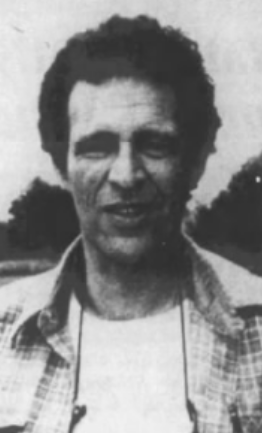
Peter Isaac Diamondstone was an American lawyer and socialist politician from the state of Vermont, best known as a perennial candidate and co-founder of the Liberty Union Party. He ran for various Vermont political offices, always unsuccessfully, in every election cycle from 1970 until 2016.

The 2022 United States Senate election in Vermont was held on November 8, 2022, to elect a member of the United States Senate to represent the state of Vermont. It was held concurrently with U.S. Senate elections in other states, along with elections to the United States House of Representatives and various state and local elections across the country. The incumbent senator, Democrat Patrick Leahy, announced on November 15, 2021, that he would not seek re-election to a ninth term, leaving the seat open for the first time since 1974, when Leahy was first elected.

Rebecca A. Balint is an American politician who is a member of the United States House of Representatives from Vermont's at-large congressional district as a member of the Democratic Party. She served as a member of the Vermont Senate from Windham County from 2015 to 2023, as majority leader from 2017 to 2021, and as president pro tempore from 2021 to 2023.
Francis K. Brooks is a Vermont educator and politician who served in the Vermont House of Representatives from 1983 to 2007. Brooks was a member of the Vermont Senate from 2017 to 2019.
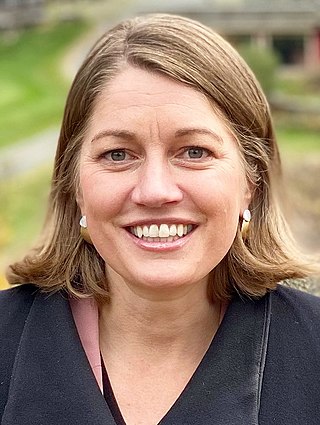
Molly Rose Gray is an American attorney and politician who served as the 83rd lieutenant governor of Vermont from 2021 to 2023. A member of the Democratic Party, she was an assistant attorney general for Vermont from 2018 to 2021.

The 2022 United States House of Representatives election in Vermont was held on November 8, 2022, to elect the U.S. representative from Vermont's at-large congressional district. The election coincided with other elections to the House of Representatives, elections to the U.S. Senate, as well as various other state and local elections.

A general election was held in the U.S. state of Vermont in 2022. All of Vermont's executive officers were up for election as well as Vermont's Class 3 U.S. Senate seat and its lone seat in the U.S. House of Representatives.
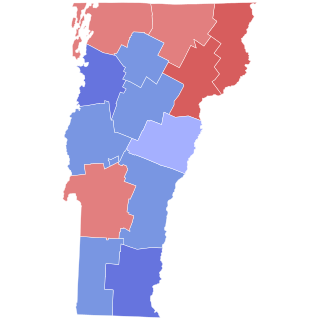
The 2022 Vermont lieutenant gubernatorial election was held on November 8, 2022, to elect the lieutenant governor of the state of Vermont. The election coincided with various other federal and state elections, including for Governor of Vermont. Primary elections were held on August 9. Vermont is one of 21 states that elects its lieutenant governor separately from its governor.
References
- ↑ "Representative Paul N. Poirier 2017-2018 Session". legislature.vermont.gov. Retrieved 2018-03-15.
- 1 2 3 4 5 6 7 8 9 10 11 12 13 14 15 "Representative Paul N. Poirier 2015-2016 Session". legislature.vermont.gov. Retrieved 2018-03-15.
- ↑ eddy 9_99 (2012). "Biography, Paul N. Poirier". Our Campaigns. ourcampaigns.com.
{{cite web}}: CS1 maint: numeric names: authors list (link) - 1 2 3 4 5 6 "Our Campaigns - Candidate - Paul N. Poirier". www.ourcampaigns.com. Retrieved 2018-03-15.
- ↑ Dillon, John (November 14, 2014). "Independent Rep. Poirier Challenges Smith For House Leadership". Vermont Public Radio. Colchester, VT.
- ↑ Jewell, Malcolm E.; Whicker, Marcia Lynn (1994). Legislative Leadership in the American States. Ann Arbor, MI: University of Michigan Press. p. 137. ISBN 978-0-472-10517-5.
- ↑ Nelson, Garrison (September 14, 2014). "Jim Jeffords, Reluctant Rebel". VT Digger. Montpelier, VT.
- ↑ "Vermont, US House At-Large, Democratic Primary, 1988". Our Campaigns. ourcampaigns.com. Retrieved November 9, 2016.
- ↑ "Garrison Nelson: Jim Jeffords, reluctant rebel - VTDigger". VTDigger. 2014-09-14. Retrieved 2018-03-15.
- ↑ "Vermont, US House At-Large, General Election, 1988". Our Campaigns. ourcampaigns.com. Retrieved November 9, 2016.
- ↑ "Vermont, US House At-Large, General Election, 1990". Our Campaigns. ourcampaigns.com. Retrieved November 9, 2016.
- ↑ "Past Elections, Paul N. Poirier". Historical Election Database. Montpelier, VT: Vermont Secretary of State. Retrieved November 9, 2016.
- ↑ Barlow, Daniel (September 13, 2009). "Party switching in Vt. nothing new". Rutland Herald. Rutland, VT.
- ↑ Delcore, Davis (December 23, 2016). "Barre councilor Poirier resigns seat". Times Argus. Barre, VT.
- ↑ Delcore, David (November 7, 2018). "Walz, Anthony sweep Poirier out of office". Barre Montpelier Times Argus . Barre, VT.
- 1 2 3 Delcore, David (October 24, 2018). "Poirier roasts councilor for online post". Barre Montpelier Times Argus . Barre, VT.